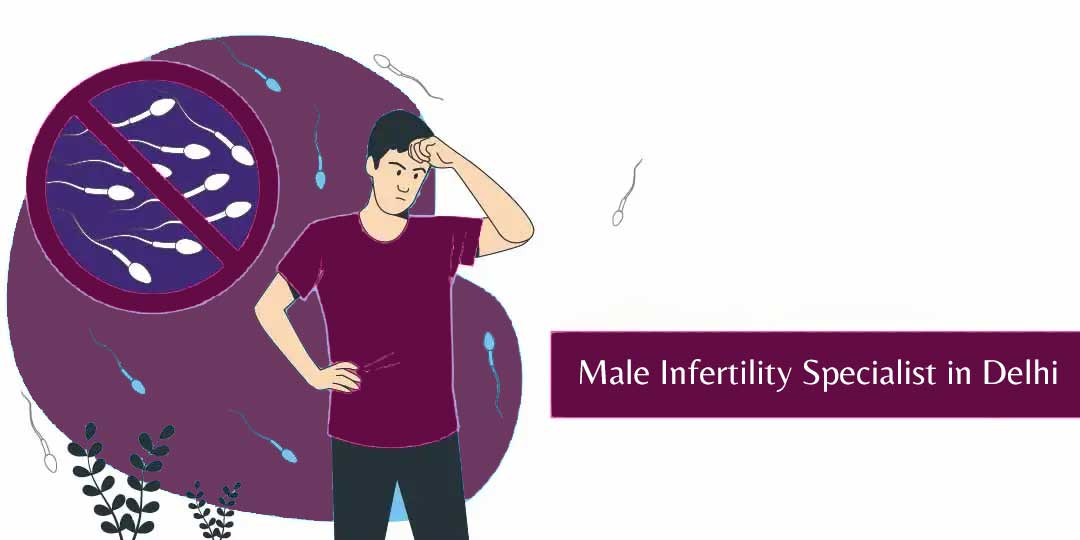
Male Infertility
Male Infertility: Diagnosis, Treatment, and Support

Male infertility refers to a condition in which a man has difficulties in achieving pregnancy with a fertile female partner. It is estimated that about 15% of couples worldwide experience infertility, and male factors contribute to around 30-40% of these cases. Male infertility can arise from various underlying factors that affect the production, quality, or transportation of sperm.
Some common causes and factors for male infertility:
Low Sperm Count (Oligospermia):
A low sperm count can reduce the chances of fertilization. The World Health Organization defines a “normal” sperm count as having at least 15 million sperm per milliliter of semen.
Abnormal Sperm Morphology:
Sperm with irregular shape or size may have difficulty in penetrating and fertilizing an egg.
Poor Sperm Motility (Asthenospermia):
Sperm need to move vigorously to reach the egg for fertilization. Reduced motility can hinder their ability to reach the egg.
Erectile Dysfunction:
Difficulties in achieving or maintaining an erection can impact sexual intercourse and, consequently, fertility.
Varicocele:
This is a condition in which the veins that drain the testicles become enlarged, leading to higher-than-normal temperatures in the testicles, which can affect sperm production and quality.
Hormonal Imbalances:
Low levels of testosterone or other hormonal imbalances can affect sperm production.
Genetic Factors:
Genetic abnormalities can impact sperm production and function.
Obstruction of the Vas Deferens:
The vas deferens is the tube that carries sperm from the testes to the urethra for ejaculation. Obstruction can prevent sperm from being ejaculated.
Environmental Factors:
Exposure to toxins, radiation, excessive heat (such as from saunas or hot tubs), and certain chemicals can affect sperm production and quality.
Lifestyle Factors:
Poor diet, excessive alcohol consumption, smoking, drug use, and obesity can negatively impact male fertility.
Symptoms for Male Infertility
The inability to conceive a child is the most obvious sign of male infertility. Other obvious signs or symptoms may not exist.
However, in some cases, an underlying problem, such as an inherited disorder, hormonal imbalance, dilated veins around the testicle, or a condition that prevents sperm from passing, causes signs and symptoms. You might notice the following signs and symptoms:
Problems with sexual function, such as difficulty ejaculating or ejaculating small amounts of fluid, decreased sexual desire, or difficulty maintaining an erection (erectile dysfunction).
In the testicle area, you may experience pain, swelling, or a lump.
Respiratory infections that reoccur
a lack of smell
Gynecomastia (abnormal breast growth)
Reduced facial or body hair, as well as other symptoms of a chromosomal or hormonal abnormality
A sperm count that is lower than normal (less than 15 million sperm per millilitre of semen or a total sperm count of less than 39 million per ejaculate)
When should you see a Infertility Doctor ?
Consult our best male infertility specialist if you haven’t conceived a child after a year of regular, unprotected intercourse, or if you have any of the following symptoms:
Erection or ejaculation issues, low sex drive, or other sexual function issues
Testicular pain, discomfort, a lump, or swelling
A history of testicular, prostate, or sexual dysfunction
Surgery on the groyne, testicle, penis, or scrotum
A partner over the age of 35
Akanksha IVF Centre, New Delhi provides the best male infertility treatment.
Our compassionate IVF experts can assist you with your health concerns. Pay a visit the best IVF Centre in Delhi.
Recent Posts
- India’s First Evidence-Based Guidelines on Poor Ovarian Response Published in Global Journal
- Future Families: How Akanksha IVF is Pioneering Emotional Fertility Coaching for Holistic Reproductive Wellness
- Can Stress Cause Infertility?
- How do electronic devices affect Fertility?
- The Future of IVF: A Bright Horizon
- Debunking Myths of Male Infertility
- Stem Cell Therapy in India
- Advanced Technologies in IVF,2025
- Impact of PCOS on Fertility
- Risks of Multiple Birth in IVF
- Impact of diet on ART and fertility
- Ectopic Pregnancy in IVF
- Types Of Male Infertility
- Ten things one must know before egg freezing
- How much does it cost to freeze eggs in India?
- What is the best age to freeze your eggs?
- How does IVF get you pregnant?
- Why IVF in India, 2024?
- Dr. K. D. Nayar
- Dr. Poonam Nayar
